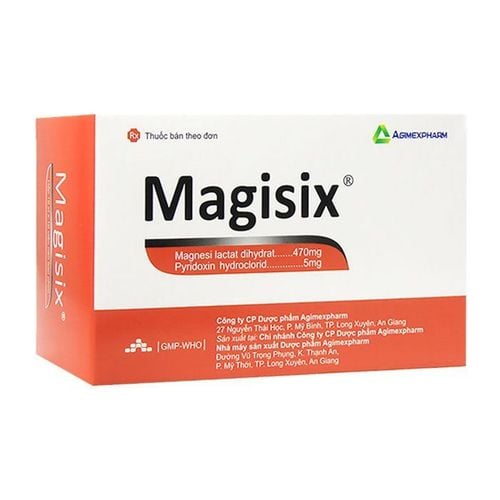This is an automatically translated article.
What is Fericap? Fericap drug is known for its use to help supplement minerals, vitamins, especially folic acid, iron... The use of the wrong dose can cause side effects that negatively affect health. . Please refer to the article below for more information about the effects and precautions when using this drug.
1. What is Fericap?
Fericap medicine has the main ingredient Vitamin B6, Vitamin C, which helps to add many vitamins and minerals to the body. Fericap is usually prescribed in the following cases:
Mineral and vitamin supplements for pregnant and lactating women. This is a group of subjects with high demand for nutrients, especially folic acid. People with iron deficiency anemia Prophylaxis of folic acid and iron deficiency for women of childbearing age, postoperative patients, malnourished people, and blood donors. On the other hand, people who are allergic to any of the ingredients of the drug are not allowed to prescribe it, which will cause allergic reactions. People with allergies such as eczema, asthma, and asthma are also contraindicated to prescribe. According to experts, not to use high doses of Vitamin C for people with glucose-6-phosphate dehydrogenase deficiency, people with a history of kidney stones, increased oxaluria and oxalate metabolism disorders, and thalassemia. In addition, patients such as hemolytic anemia, hemosiderin infection and iron-contaminated tissue disease are also not indicated to use Fericap because the body has an excess of iron.
2. Dosage and usage of the drug Fericap
Fericap is made in the form of tablets, so it should be taken orally. Patients should take the medicine with warm or filtered water, not with fruit juices or alcoholic beverages.
Depending on each object, the dose will be different. Below are the recommended dosages of Fericap.
For pregnant and lactating women: Take only 1 pill a day, 1 tablet each time. For people with iron deficiency anemia: Take 1 to 2 tablets per day. For the treatment of folic acid and iron deficiency for malnourished people, people of childbearing age, blood donors and patients after surgery: Take 1 to 2 tablets per week.
3. Fericap side effects
Before prescribing drugs, doctors always weigh the benefits and effectiveness of Fericap more than the risk of side effects. However, some cases when using Fericap can still occur unwanted effects.
Besides the therapeutic uses, Fericap can cause some side effects for patients such as: Nausea, vomiting, heartburn... Some less common side effects can include itching, hives, rash.
The above are not all side effects of this medicine. During use, if you encounter any unusual symptoms suspected of being caused by the drug, you should notify your doctor for advice and dosage adjustments.
4. Fericap drug interactions
Before being prescribed Fericap, you need to tell your doctor about all other medicines you are taking including over-the-counter medicines, vitamins, prescription drugs and herbal products. This helps you reduce the risk of an interaction between Fericap and other drug classes. Do not start, stop or change the dose of any medicine without your doctor's consent. Some drugs can cause interactions when used with Fericap such as:
Taking Vitamin C with Aspirin will increase the excretion of Vitamin C and reduce the excretion of Aspirin in the urine. After taking Vitamin C, acidification of the urine may alter the excretion of other drugs. Oral contraceptives will reduce the metabolism of folate and reduce folate and vitamin B12 to a certain extent. Pyridoxine will reduce the effect of Levodopa used in the treatment of Parkinson's disease. When taken with antacids such as sodium carbonate, calcium carbonate or tea, the absorption of iron can be reduced. Iron can reduce the absorption of Levodopa, Quinolins, Penicilamin, Methyldopa, Thyroid hormones and Zinc salts.
5. Notes when using the drug Fericap
Here are some notes when using Fericap that will help you promote the effects of the drug as well as reduce the risk of experiencing side effects.
Always keep medicine out of reach of small children. Fericap will not be effective if it has expired. Therefore, if you notice that the medicine is distorted, discolored or the medicine has been exposed to the air for too long, it should be discarded. Long-term use of high doses of Vitamin C can lead to drug resistance, so reducing the dose will lead to Vitamin C deficiency. If you take large doses of Vitamin C during pregnancy, your baby will have scurvy. Patients with folate-dependent tumors should be carefully considered before taking this drug. Do not use iron to treat hemolytic anemia, unless there is also iron deficiency in the case. Treatment should not be continued for more than 6 months without the supervision of a doctor or pharmacist. Iron should not be used in combination with oral iron to avoid iron overload. Patients who regularly receive blood transfusions should not take the drug. The drug does not affect the ability to drive and use machines. There are no risks associated with vitamin C when taken according to normal daily requirements. However, taking large amounts of Vitamin C during pregnancy may result in an increased need for Vitamin C and possibly scurvy in the newborn. Folic acid should be supplemented for pregnant women, especially those who are being treated for malaria or epilepsy. Vitamin B6 will not harm an unborn baby if taken in doses according to daily needs. However, high doses can cause neonatal dependency syndrome. Vitamin C is distributed in breast milk and no problems have been observed in infants when taking Vitamin C on a normal basis. Folic acid can be used by nursing mothers.
Please dial HOTLINE for more information or register for an appointment HERE. Download MyVinmec app to make appointments faster and to manage your bookings easily.













